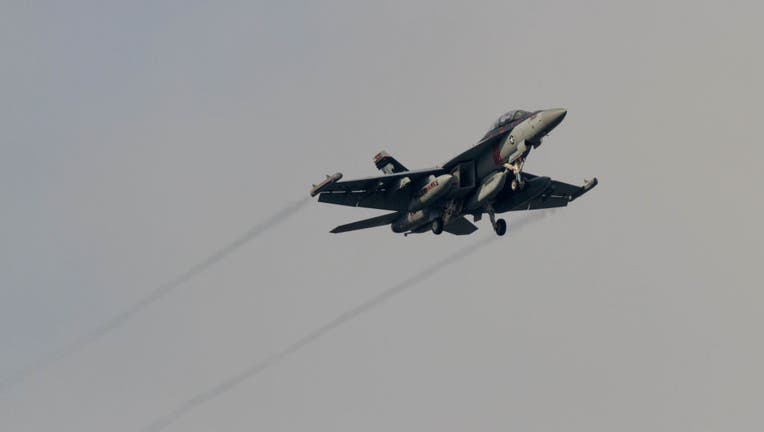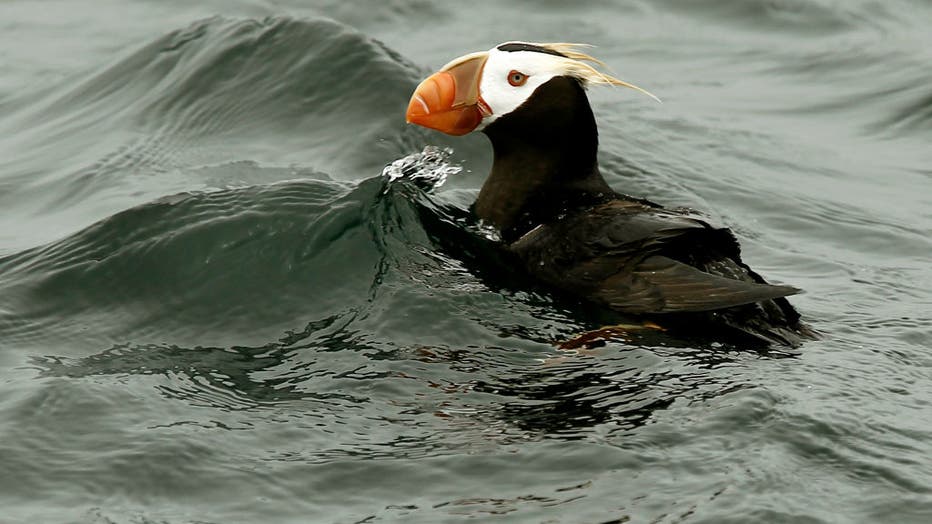AG: Court rules Navy dismissed health, environmental impacts of its Growler jet program

YAMATO, JAPAN - 2016/05/31: A Boeing EA-18G Growler jet fighter with the VAQ-141, US Navy Electronic Attack Squadron known as the Shadow hawk flies low over Chuo Rinkan in Kanagawa, Japan. (Photo by Damon Coulter/SOPA Images/LightRocket via Getty Ima
SEATTLE - A federal judge ruled that the Navy’s Growler jet program on Whidbey Island illegally failed to consider how the noise from the jets could negatively impact classroom learning and local wildlife, according to a Wednesday announcement from Attorney General Bob Ferguson’s Office.
In March 2019, the Navy authorized an expansion of its Growler program, which are jets designed to fly low in order to jam enemy communications. While the program was intended to benefit military progress, an increase of 110,000 flights roaring over the Whidbey Island community every year ignited a lawsuit from the AG’s Office.

Washington state Attorney General Bob Ferguson (Photo by Stephen Brashear/Getty Images)
"The Navy has an important job," Ferguson said. "But that does not relieve the federal government of its obligation to follow the law and take a hard look at the public health and environmental impacts of its programs. Today the judge ruled that the Navy fell short of its obligation."
According to the AG’s Office, the State Department of Health provided information to the Navy outlining how exposure to loud noise can lead to the following:
- Negative health conditions
- Childhood learning impacts
- Disturbances in sleep
- Cognitive impairment
- Cardiovascular disease
The state’s lawsuit claimed that the Navy dismissed this information, and the court agreed.
RELATED: Federal judge says Navy jets impacting Whidbey Island

A Tufted Puffin, foats near the Farallone Islands off the coast San Francisco, Ca., on Saturday August 27, 2011. (Photo By Michael Macor/The San Francisco Chronicle via Getty Images)
In addition, the state’s lawsuit claims that the Navy failed to consider how the loud roaring from Growler jets could impact various bird species. According to the AG’s Office, the noise level produced from the jets has the potential to affect a bird’s ability to feed and breed over time. The area where the Growler jets take-off and land is near a habitat for tufted puffins, which is listed as an endangered species in Washington State.
On Wednesday, a federal judge ruled that the Navy’s failure to analyze this information is a violation of the National Environmental Policy Act.
RELATED: Puffins not the only sea birds struggling in Washington
Citizens of Ebey’s Reserve, a nonprofit based on Whidbey Island, filed a similar lawsuit claiming that the Navy did not consider expanding their program to any other areas, nor did they consider the greenhouse gas impacts of Growler fuel use.
"Here, despite a gargantuan administrative record, covering nearly 200,000 pages of studies, reports, comments, and the like, the Navy selected methods of evaluating the data that supported its goal of increasing Growler operations," Chief Magistrate Judge J. Richard Creatura wrote in his 38-page recommendation. "The Navy did this at the expense of the public and the environment, turning a blind eye to data that would not support this intended result."
According to the AG’s Office, the state and the other parties now have 30 days to either agree on a solution or a briefing schedule on a remedy.
RELATED: Whidbey Island residents grumbling over Navy's Growler jet noise

AG: Project to collect lawfully owed DNA from sex offenders in WA is complete
Justice long delayed may finally be delivered—that's the hope and focus of a major new initiative from Washington's attorney general.
Assistant Attorneys General Aurora Janke, Junine So, and Bill Sherman, and paralegals Tricia Kealy and Nerissa Tigner with the Environmental Protection Division are handling this case on behalf of the Attorney General’s Office.

